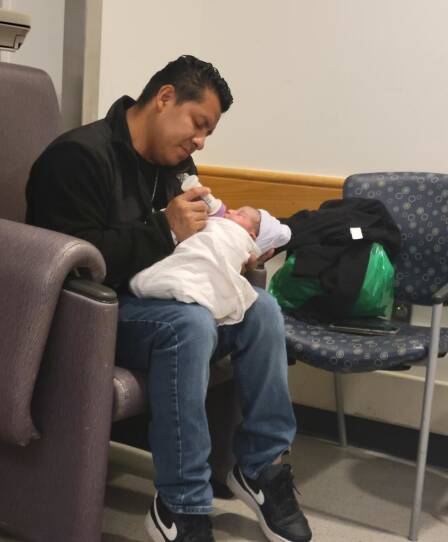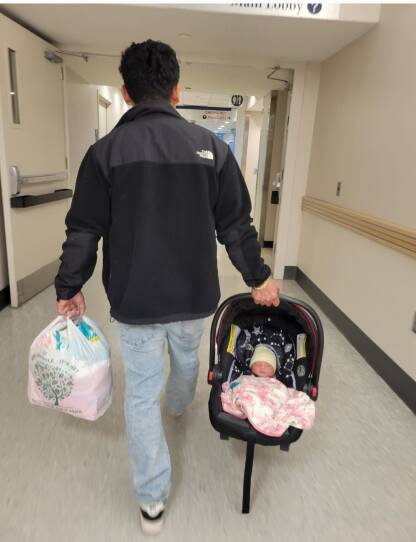Si desea leer este artículo en español visite El Planeta.
Attorneys for a Chelsea man who was just deported are calling his case a miscarriage of justice, saying he should not have been sent back to his native Guatemala while an immigration judge was actively considering his appeal.
Sara Nael, an attorney representing 35-year-old Sergio Ayala Mejia, said her client had a pending appeal to reopen his immigration case and that it was highly unusual for a deportation to proceed when a ruling on an appeal is imminent.
The Department of Homeland Security declined to comment, citing ongoing litigation in the case.
Speaking to GBH News from Guatemala, Mejia said he was first arrested by U.S. Immigration and Customs Enforcement agents on September 17th. He was driving his sister to her job at Market Basket in Revere when they were pulled over by three black SUVs.
He said he was anxious after seeing news reports about aggressive ICE agents and that he complied with their commands.
“The guy said, ‘Sergio, I know who you are. So open the door. Open your windows and open doors. And you know what happens next if you don’t do that,’” he said. “I was in shock — I didn’t even hear what exactly they said but I’m sure they, I’m kind of sure like they said, like, if I have papers basically.”
At one point, an agent told him he had an order for removal for failing to appear at a court hearing years before, which he said didn’t initially make any sense to him.
Mejia was arrested and sent to a detention center in New York, and then on to another one in Louisiana. The conditions at both were inhumane, he said. His attorney filed an appeal in Boston on September 25th, arguing that the circumstances warranted having his immigration case reopened. But within days, as a judge was still considering his appeal, Mejia was deported to Guatemala, leaving behind a partner, an infant, a toddler and a daughter with autism.

Arrest and Deportation
Mejia crossed into the U.S. at the Mexican border in mid-2006 as an unaccompanied minor at the age of 16.
In a signed declaration to the court, Mejia said he was threatened in his home country by MS-13 gang members, who approached him three to four times a week when he was leaving school.
“I didn’t feel safe living in Guatemala, because when I told them I would not join them, they started to threaten and harass me,” he said in the declaration.
After crossing the border, he was detained and released into U.S. He moved in with an uncle in Lynn and provided that address to immigration officials. Without an attorney and not yet knowing English, Mejia attended two immigration hearings with his uncle in 2007. But that year, he was ordered removed in absentia when he didn’t show up to a third immigration court date that he now says he didn’t know about.
Attorneys argue in court documents that his failure to appear as a 17-year-old should be “imputed” on his uncle, who Mejia accuses of withholding immigration documents from him and abusing him.
The motion to re-open his case was filed on September 26th and cited “exceptional circumstances beyond his control” as a youth. His attorneys also asked for a stay of his removal from the U.S. and filed an asylum claim while he was detained.
Still, he was deported on October 1st, with little notice and no ability to call anyone. Mejia was led onto a plane he described as packed with people, including a family with children.
On that same day, immigration Judge Michelle Kahan granted his motion to reopen his case, rescinding his 2007 removal order. But by that point, Mejia was already on his way to Guatemala.
“The day he was removed from the United States was the day it was granted, which makes things even worse,” said Nael, his attorney. “Now this realization was like, they’re probably already on notice that it was granted and they still wrongfully removed him.”
Nael said she has never seen a client deported while a motion to reopen a case is still pending. She said he has no criminal record or interaction with police here or abroad.
“This is technically going against the client’s due process rights. They should have waited to see if the judge was going to grant or deny the motion to reopen instead of just removing him out of state without a decision,” she said.
U.S. Rep. Ayanna Pressley, whose district includes Chelsea, issued a statement calling for Mejia’s immediate return. She called the deportation “a brazen violation of his right to due process and another damning example of the Trump administration trampling on the constitutional rights of Massachusetts residents.”
Pressley indicated that the federal shutdown was complicating her ability to get more information about the case due to the closure of ICE’s congressional relations office.
Impact on Family
In Guatemala, Mejia is living with a family member and says he has fallen into depression. He had to take a bus to another town to borrow a phone with a signal to talk to GBH News.
“I don’t know what’s going to happen with my kids. I’m far away from them, like I miss them every day, every minute,” he said.
Mejia is worried about the strain on his wife, who must now take care of the children but also find a way to pay the bills.
“She’s doing really bad — worse and worse. I’m afraid that something can happen to her and the kids because I can hear her like … in depression, it’s the pressure,” he said.
His partner, who GBH News is not naming due to her own deportation fears, said “every day has been difficult — my oldest can’t be alone at home, and I’m dedicated to taking care of her. I think … what am I going to do with three children?”

Mejia has a 3-year-old, Liam, and an infant, Ailany, who was just over two weeks old when he was detained. He also has been the long-time parent to his partner’s 14-year-old daughter, Ashley, who was abandoned by her biological father as a baby. She was recently diagnosed with autism, according to medical records shared with GBH News.
“The kids keep asking ‘Why isn’t dad coming? When will be home?’” she said.
The partner told GBH News that the impact of Mejia’s deportation on the kids has been devastating. Liam won’t eat much, and Ashley is afraid to go to school, worried her mom will be gone when she returns.
Her educational records from Chelsea High School show that she requires speech therapy, motor skill training, and a “high level of adult support and supervision.”
Mejia’s aunt, Julia Ayala, has been driving down from Lynn to help care for the children, and bring food. She told GBH News that the day Mejia called from Guatemala, his deportation came as “a shock”.
“I started crying, because I knew he was out of the country, it’s hard to come back, and he has children,” Ayala said. “They depend on him for everything.”
Mejia was working full time as a painter to pay all of the family’s expenses. Julia tried speaking to their landlord to delay paying the rent with little luck, but family members chipped in for October rent.
Records shared with GBH News show that Mejia has paid taxes for at least the last ten years. A number of support letters, including from colleagues, friends and family called him a “role model,” an “honest man, trustworthy” and that he works “tirelessly to support his partner, toddler and newborn baby.”
A Mass General Hospital-Chelsea Healthcare Center doctor who cares for Ashley also wrote to the government saying he plays “an important role in her ongoing care and is essential to supporting her overall health.”
Mejia told GBH News he fears being tortured or killed in Guatemala. He has a court hearing October 23 though the Boston immigration court. His family hopes he can somehow return legally by then, but is unsure how. On Monday morning, Nael said the government is opposing his motion to reopen the case.





